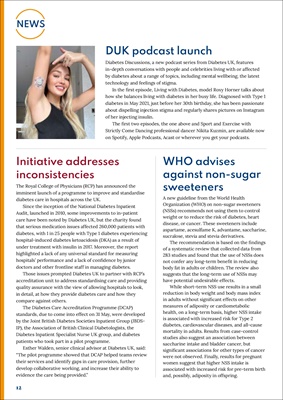
12
NEWS
DUK podcast launch
Diabetes Discussions, a new podcast series from Diabetes UK, features
in-depth conversations with people and celebrities living with or affected
by diabetes about a range of topics, including mental wellbeing, the latest
technology and feelings of stigma.
In the first episode, Living with Diabetes, model Roxy Horner talks about
how she balances living with diabetes in her busy life. Diagnosed with Type 1
diabetes in May 2021, just before her 30th birthday, she has been passionate
about dispelling injection stigma and regularly shares pictures on Instagram
of her injecting insulin.
The first two episodes, the one above and Sport and Exercise with
Strictly Come Dancing professional dancer Nikita Kuzmin, are available now
on Spotify, Apple Podcasts, Acast or wherever you get your podcasts.
Initiative addresses
inconsistencies
The Royal College of Physicians (RCP) has announced the
imminent launch of a programme to improve and standardise
diabetes care in hospitals across the UK.
Since the inception of the National Diabetes Inpatient
Audit, launched in 2010, some improvements to in-patient
care have been noted by Diabetes UK, but the charity found
that serious medication issues affected 260,000 patients with
diabetes, with 1 in 25 people with Type 1 diabetes experiencing
hospital-induced diabetes ketoacidosis (DKA) as a result of
under treatment with insulin in 2017. Moreover, the report
highlighted a lack of any universal standard for measuring
hospitals' performance and a lack of confidence by junior
doctors and other frontline staff in managing diabetes.
Those issues prompted Diabetes UK to partner with RCP's
accreditation unit to address standardising care and providing
quality assurance with the view of allowing hospitals to look,
in detail, at how they provide diabetes care and how they
compare against others.
The Diabetes Care Accreditation Programme (DCAP)
standards, due to come into effect on 31 May, were developed
by the Joint British Diabetes Societies Inpatient Group (JBDSIP),
the Association of British Clinical Diabetologists, the
Diabetes Inpatient Specialist Nurse UK group, and diabetes
patients who took part in a pilot programme.
Esther Walden, senior clinical advisor at Diabetes UK, said:
"The pilot programme showed that DCAP helped teams review
their services and identify gaps in care provision, further
develop collaborative working, and increase their ability to
evidence the care being provided."
To read more, CLICK HERE.
WHO advises
against non-sugar
sweeteners
A new guideline from the World Health
Organization (WHO) on non-sugar sweeteners
(NSSs) recommends not using them to control
weight or to reduce the risk of diabetes, heart
disease, or cancer. These sweeteners include
aspartame, acesulfame K, advantame, saccharine,
sucralose, stevia and stevia derivatives.
The recommendation is based on the findings
of a systematic review that collected data from
283 studies and found that the use of NSSs does
not confer any long-term benefit in reducing
body fat in adults or children. The review also
suggests that the long-term use of NSSs may
have potential undesirable effects.
While short-term NSS use results in a small
reduction in body weight and body mass index
in adults without significant effects on other
measures of adiposity or cardiometabolic
health, on a long-term basis, higher NSS intake
is associated with increased risk for Type 2
diabetes, cardiovascular diseases, and all-cause
mortality in adults. Results from case-control
studies also suggest an association between
saccharine intake and bladder cancer, but
significant associations for other types of cancer
were not observed. Finally, results for pregnant
women suggest that higher NSS intake is
associated with increased risk for pre-term birth
and, possibly, adiposity in offspring.
To read more, CLICK HERE.